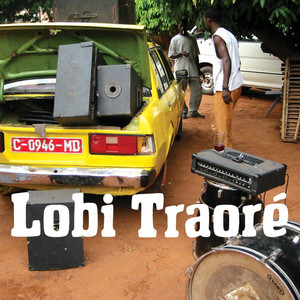
The Lobi Traore Group
- 流派:World Music 世界音乐
- 语种:英语
- 发行时间:2010-03-26
- 唱片公司:Honest Jon's Records
- 类型:录音室专辑
- 歌曲
- 时长
-
Component 1
简介
Perhaps nowhere in African music is the link with American blues more raw and cogent than in the music of Mali's Lobi Traore Band; though Lobi himself — the so-called 'Bambara bluesman' — is ambivalent. 'When I was young, before I even knew I would become a musician, I listened to a lot of blues - John Lee Hooker and all that,' he says. 'Maybe I was inspired by it. Maybe the blues was inspired by Africa. Maybe it's just a coincidence. But, listen - the music I play comes from me and from my place.' Lobi Traore was born in 1961 in Bakaridianna, Mali, on the left bank of the River Niger fifteen miles from Segou. Both his parents were singers, and members of the komo — the most important of three secret castes in Bambara society, charged with the custodianship of divine knowledge. Lobi followed in their footsteps and in adolescence undertook a series of initiation rites that included walking through fire, living in a forest inhabited with wild animals, and going days without food and water. When his initiation was complete, he entered the komo and undertook never to betray its mysteries. At the same time he pursued his training as a musician, moving to Segou in 1977 to sing with a traditional Bambara folk group. Before long he had moved on again — to the Malian capital Bamako, 150 miles to the south-west, where he got his first guitar and joined the Djata Band, one of the first Malian orchestras to tour France. Soon afterwards Lobi began his solo career, playing at weddings and in bars such as the now-closed Bozo, once the most jumping nightspot in Bamako, where he established a popular residency. He also travelled to Abidjan for a three month club engagement — and ended up staying seven years. Back in Mali, he recorded his debut album Bambara Blues in 1991, followed in 1994 by Segou, which was produced by Ali Farka Toure. He also toured extensively in Europe, recording his album Duga there at the end of the decade. By now, Lobi was not only a notable musician but one of Bamako's most flamboyant characters. He wasn't playing formal concerts for foreigners at cultural centres, but entertaining beer drinkers in the city's funkiest bars. He also cut a dashing figure, as Banning Eyre describes in his book In Griot Time : 'Lobi stood barely five feet, but he made up for his diminutive stature with an outrageous wardrobe. Rarely seen without his brown French beret, Lobi could fill out his look in radically different modes. Sometimes he played the proud Bambara hunter in patterned brown and black mud-cloth robes. Other times he dressed in biker's leather or a lumberjack's plaid shirt and blue jeans. His kinkiest outfit including a matching vest-and-trousers combination made from a furry, bright green material.' The album was recorded outdoors, in a yard with a broken-down bar and disused concrete dancefloor, at the end of a dirt road on the outskirts of Bamako. The venue had once been an open-air club called the Ma Kele Kele, where Lobi often performed, but had long since been closed down by the police. (Now getting shut down takes some doing in Bamako, where once it's dark, pretty much anything goes. But the Ma Kele Kele had managed it scandalously, after a couple having sex in the branches of a mango tree had fallen onto a dancer below.) Lobi's young band arrived with a drum kit strapped to the roof of a battered old car and over the next week — a day was lost when a huge thunderstorm knocked the electricity out — both band and engineers powered up with a single skinned cable running across the red mud from the bar, as turkeys and geese pecked at the microphones. As you can hear, what the sessions disdained in terms of sophistication, they make up for in pure, spontaneous energy. There were no overdubs, no second takes. Just Lobi and his band conjuring their feral Malian magic under African skies. The Bambara blues at its stone funkiest: 'hallucinogenic... very far-out' (The Beat).






